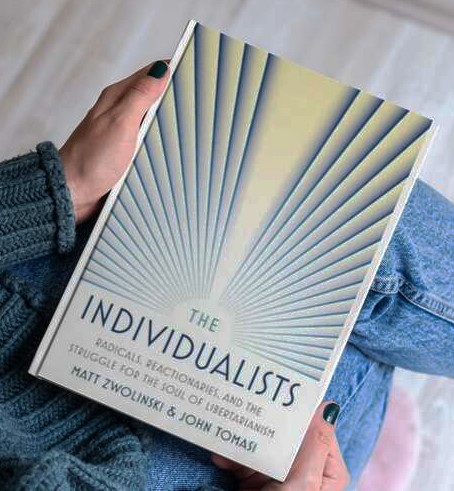This week’s selected media, January 5, 2025: The Anti-Jefferson: Why Robert Carter III Freed His Slaves (And Why We Couldn’t Care Less) and The Individualists
This week I finished:

The Anti-Jefferson: Why Robert Carter III Freed His Slaves (And Why We Couldn’t Care Less), by Andrew Levy: This piece was a journal article in the spring 2001 issue of The American Scholar.
Robert Carter III plays a major role in Sustainability Simplified as a contrast to Jefferson, Washington, and their peers who spoke of freedom but did not free their slaves. Carter freed all his slaves during his lifetime. His slaveholding neighbors disliked him for it. He was “extreme” in his time. I consider him as a role model for being called “extreme” in my time. Future generations will consider it obvious how most people today are violating their own values and how their rationalizations and justifications carry no more credibility than Jefferson’s and Washington’s. How many slaves would you have kept in 1790 had you been born a slaveholder to avoid being “extreme?”
Levy wrote a book on Carter. This article gives highlights of Carter’s freeing his slaves as well as of his life. It also asks why American history has barely covered him. The main answer contrasts why we continue to speak of Jefferson, Washington, and their peers. Yes, many condemn them and nearly all acknowledge their flaws, but they still get all the attention. Levy suggests that since they are flawed, we can accept flaws in ourselves: we aren’t solving racism either. Everyone can say that big action on their own part would ask too much and might not help.
By contrast, Carter shows what each of us can do because he did it: we can change our whole lives and be glad for it. Levy connects that ability to act to race, but it applies as much to sustainability.
Levy also considers the struggles Carter faced, internal and external. I recommend this piece.
I also found this CNN article that quoted Levy on why Americans seem to bury Carter’s story: Like Washington and Jefferson, he championed liberty. Unlike the founders, he freed his slaves:
Levy, whose books include a biography of Carter, “The First Emancipator,” has another suspicion: America doesn’t care – because it’s inconvenient.
“It blows an enormous hole in this legacy we’re trying to balance for these founders,” he said.
As Levy sees it, American history feebly attempts to level the founding fathers’ fondness for freedom with their ownership of humans by uncritically parroting their assertions that there was no pragmatic way to emancipate hundreds of thousands of slaves. Slavery was a necessary evil, to hear the founders tell it.
“If Carter is the anti-Jefferson,” Levy wrote in his book, “the man who did not lack the will to free his own slaves but who did lack the vision and clarity to make his love of freedom eloquent, then the Deed of Gift is the anti-Declaration of Independence, a document that makes liberty look dull but which is so absent of loopholes and contradictions that no result but liberty could prevail.”
Jefferson had said about slavery, “As it is, we have the wolf by the ear, and we can neither hold him, nor safely let him go. Justice is in one scale, and self-preservation in the other.” He wanted to say freeing slaves would sacrifice self-preservation, but that view was self-serving. Carter belied it, having freed his slaves thirty years before Jefferson wrote those words.
People today see pollution and depletion as Jefferson saw slavery: we know what’s right yet we tell ourselves we can’t do it. I’m like Carter: I’m doing it, showing that we’re lying to ourselves.

The Individualists: Radicals, Reactionaries, and the Struggle for the Soul of Libertarianism, by Matt Zwolinski and John Tomasi: In preparing to speak at the Cato Institute in December, I spoke to an NYU scholar I met last summer at Peter Singer’s going-away symposium at Princeton who values libertarianism. I had run into him again at an event hosted by Heterodox Academy, the group promoting viewpoint diversity started by podcast guest Jonathan Haidt. The event was to launch Heterodox Academy’s new quarterly journal.
Then I met the Editor at Large of Reason magazine, Nick Gillespie, which led me to read, watch, and listen to a lot of his material. At my talk at Cato, an attendee pointed out I didn’t distinguish enough between conservatives and libertarians.
The NYU scholar had suggested this book. One of its authors, John Tomasi, is the president of Heterodox Academy and I saw him speak at the journal launch.
In other words, a half-dozen meetings led me to read this book. It’s dense and comprehensive. Now I know more about libertarian views, history, and contrasts and similarities with the left and right. I didn’t realize how the Cold War alliance between conservatives and libertarians didn’t go back that long, nor was it that deep, meaning I overestimated the connection between the two groups. I hadn’t seen the principles that define libertarianism and distinguish it from other groups enumerated and clarified.
Read my weekly newsletter

On initiative, leadership, the environment, and burpees
Pingback: This week’s selected media, February 2, 2025: The First Emancipator, Plutarch’s Parallel Lives, Will & Harper » Joshua Spodek